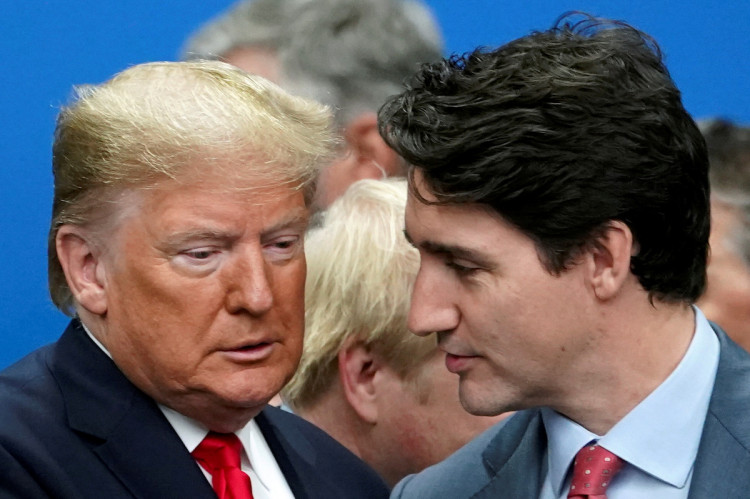Canadian Prime Minister Justin Trudeau met with President-elect Donald Trump at Trump's Mar-a-Lago estate in Florida on Friday evening, seeking to defuse tensions sparked by Trump's proposal to impose a sweeping 25% tariff on goods from Canada and Mexico. The meeting, unannounced on either leader's official schedule, comes just days after Trump vowed to enact the tariffs upon taking office, citing concerns over illegal immigration and drug trafficking.
Trudeau arrived in Palm Beach late Friday, accompanied by Public Safety Minister Dominic LeBlanc and his chief of staff, Katie Telford. The high-stakes dinner was attended by several key figures from Trump's transition team, including Commerce Secretary nominee Howard Lutnick and national security adviser pick Florida Rep. Mike Waltz.
Trump's tariff threat, which he announced on his Truth Social platform earlier this week, has rattled the foundations of North American trade. "This tariff will remain in effect until such time as drugs, in particular fentanyl, and all illegal aliens stop this invasion of our country!" Trump declared.
The proposal marks a continuation of Trump's aggressive stance on trade, which during his first administration led to the renegotiation of the North American Free Trade Agreement (NAFTA) into the USMCA. While many goods from Canada and Mexico are currently exempt from tariffs under the USMCA, Trump's plan raises questions about how such measures would align with the agreement.
During a Friday press conference ahead of his visit, Trudeau emphasized the potential fallout from Trump's proposed tariffs. "Donald Trump, when he makes statements like that, he plans on carrying them out. There's no question about that," Trudeau said. "Our responsibility is to point out that in this way, he would be not just harming Canadians who work so well with the United States. He'd actually be raising prices for American citizens as well, and hurting American industry and businesses."
Trudeau's visit followed a brief phone call with Trump earlier in the week, during which the two leaders discussed border security and trade. Trudeau described the conversation as "good" but acknowledged that Trump's tariff threats were serious and required immediate attention.
Canada, the United States' largest trading partner, exported $482 billion in goods and services to its southern neighbor in 2023, according to the Congressional Research Service. The potential tariffs could disrupt supply chains and increase costs for consumers and businesses on both sides of the border.
While Trudeau sought to address the issue diplomatically, Mexico has signaled a more combative approach. Mexican President Claudia Sheinbaum, who also spoke with Trump this week, denied agreeing to close the US-Mexico border as Trump claimed. She has warned that Mexico would impose counter-tariffs in response to any unilateral US measures.
Trump's hardline stance has drawn criticism from outgoing President Joe Biden, who called the tariff plan "counterproductive" and warned it could damage relations with Canada and Mexico. Biden emphasized the importance of maintaining stable trade partnerships, particularly with neighboring allies.
As Trudeau dined with Trump and his team, the prime minister reiterated Canada's commitment to fostering strong bilateral ties. Trudeau said that they will "work together to meet some of the concerns and respond to some of the issues."
However, the path forward remains uncertain. While Trump's supporters praise his tough rhetoric on trade and border security, critics fear that his tariff plan could unravel years of economic cooperation and ignite trade wars with key allies.






